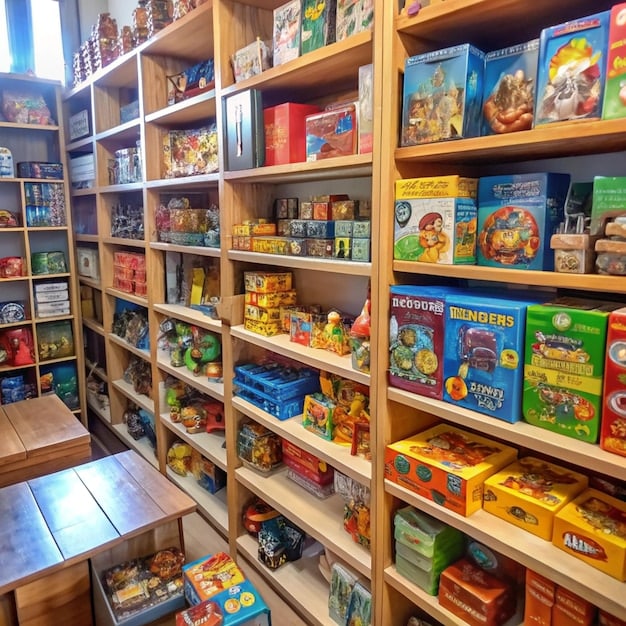The Resurgence of Board Games: Why Analog is Making a Comeback

The resurgence of board games reflects a growing desire for face-to-face social interaction and tactile experiences, offering a screen-free alternative to digital entertainment and fostering community among players of all ages and interests.
The clatter of dice, the shuffling of cards, and the strategic placement of pieces on a board – these are the sounds of the resurgence of board games, an analog pastime experiencing a remarkable comeback in our increasingly digital world.
The Timeless Appeal of Board Games
Board games have been around for centuries, evolving from ancient strategy games to the modern classics we know and love. Their enduring appeal lies in their ability to bring people together, challenge our minds, and provide hours of entertainment.
But what is it about board games that continues to draw us in, even in an age dominated by video games and streaming services?
A Break from the Digital World
In an increasingly digital world, board games offer a welcome respite from screens and notifications. They allow us to disconnect from technology and reconnect with each other in a tangible way.
Social Interaction and Connection
One of the biggest draws of board games is the opportunity for social interaction. Unlike solo video games or online multiplayer, board games require players to be physically present and engaged with one another.
- Face-to-face interaction promotes genuine communication and strengthens relationships.
- Shared experiences create lasting memories and inside jokes.
- Collaborative games encourage teamwork and problem-solving.
Board games provide a unique space for people to connect, laugh, and create shared experiences that are often missing in our digital lives. They foster a sense of community and belonging, reminding us of the importance of face-to-face social interaction.

Factors Driving the Board Game Renaissance
The resurgence of board games is not just a nostalgic trend; it’s a full-blown renaissance driven by several key factors. From innovative game design to a growing sense of community, there are many reasons why people are rediscovering the joy of analog gaming.
Let’s examine the different drivers that feed this resurgence.
Innovative Game Design
Modern board game designers are pushing the boundaries of creativity and innovation. They are creating games with captivating themes, intricate mechanics, and engaging narratives that appeal to a wide range of players.
The Rise of Crowdfunding
Platforms like Kickstarter and Gamefound have revolutionized the board game industry, allowing independent designers to connect directly with potential backers and raise funds to bring their games to life. This has led to an explosion of unique and innovative games that might never have been produced through traditional publishing channels.
- Crowdfunding empowers independent designers and fosters innovation.
- It allows gamers to directly support the creation of games they are passionate about.
- It builds a sense of community around new and upcoming games.
Crowdfunding has democratized the board game industry, giving voice to independent designers and providing gamers with access to a wider variety of innovative and creative games.
The Educational Benefits of Board Games
While board games are undoubtedly fun and entertaining, they also offer a wide range of educational benefits for players of all ages. From developing critical thinking skills to improving social skills, board games can be a valuable tool for learning and personal growth.
Let’s see how board games can benefit our brain:
Developing Critical Thinking Skills
Many board games require players to think strategically, plan ahead, and make calculated decisions. These games challenge players to analyze situations, evaluate options, and anticipate consequences, all of which are essential critical thinking skills.
Improving Problem-Solving Abilities
Board games often present players with puzzles, challenges, and obstacles that they must overcome to win. This requires players to think creatively, come up with innovative solutions, and adapt to changing circumstances.
- Abstract strategy games hone logical reasoning and deduction skills.
- Cooperative games teach teamwork and collaborative problem-solving.
- Resource management games develop decision-making and prioritization skills.
Board games provide a fun and engaging way to exercise our minds, sharpening our problem-solving abilities and fostering a lifelong love of learning.

The Therapeutic Value of Board Games
In addition to their educational benefits, board games can also have a therapeutic effect on players. They can reduce stress, improve mood, and promote a sense of well-being.
How can playing board games improve our mental helath?
Reducing Stress and Anxiety
The act of playing a board game can be a relaxing and enjoyable way to unwind after a long day. Board games provide a distraction from our worries and anxieties, allowing us to focus on the present moment and enjoy the company of others.
Boosting Mood and Self-Esteem
Winning a board game, mastering a new strategy, or simply spending time with friends can provide a boost to our mood and self-esteem. Board games offer a sense of accomplishment and belonging, reminding us of our strengths and capabilities.
- Cooperative games foster a sense of shared achievement and camaraderie.
- Strategy games provide a mental challenge that can be both stimulating and rewarding.
- Social deduction games offer opportunities for laughter and lighthearted fun.
From reducing stress to boosting mood, board games offer a variety of therapeutic benefits that can contribute to our overall well-being.
The Board Game Community
The resurgence of board games has been accompanied by the growth of a vibrant and welcoming community of gamers. From local game stores to online forums, there are countless opportunities to connect with other board game enthusiasts, share your passion, and discover new games.
What can a game community provide for its players?
Local Game Stores
Local game stores are the heart and soul of the board game community. They provide a physical space for gamers to gather, browse new releases, and participate in organized play events.
Online Forums and Communities
Online forums and communities like BoardGameGeek provide a platform for gamers to connect, discuss games, and share their experiences. These online spaces are a valuable resource for learning about new games, finding opponents, and getting advice from experienced players.
- Online forums foster a sense of community among geographically dispersed gamers.
- They provide a platform for sharing reviews, ratings, and recommendations.
- They offer opportunities to participate in online tournaments and leagues.
Board game conventions and festivals provide opportunities for gamers to meet their favorite designers, play new games, and celebrate their shared passion for analog gaming.
The Future of Board Games
The resurgence of board games shows no signs of slowing down. As technology continues to advance and our lives become increasingly digital, the appeal of analog entertainment and face-to-face social interaction will only grow stronger.
What does the future hold for this engaging hobby?
Augmented Reality Board Games
The integration of Augmented Reality (AR) technology into board games could create entirely new gaming experiences, blurring the lines between the physical and digital worlds. Imagine playing a strategy game where virtual units come to life on the board, or a mystery game where clues are hidden in your real-world environment.
Personalized Gaming Experiences
Artificial Intelligence (AI) could be used to personalize board game experiences to individual players’ skill levels, preferences, and learning styles. This could make board games more accessible and engaging for a wider range of people.
- AI-powered games could dynamically adjust difficulty based on player performance.
- They could generate personalized storylines and challenges.
- They could provide real-time feedback and guidance to players.
In the future board game creators will continue to innovate, experiment, and push the boundaries of what is possible, ensuring that board games remain a vibrant and relevant form of entertainment for generations to come.
| Key Point | Brief Description |
|---|---|
| 🎲 Social Interaction | Fosters face-to-face communication and strengthens relationships. |
| 🧠 Educational Benefits | Develops critical thinking, problem-solving, and decision-making skills. |
| 🧘 Therapeutic Value | Reduces stress, improves mood, and enhances overall well-being. |
| 🤝 Community Growth | Connects enthusiasts through local stores and online platforms. |
FAQ
▼
Board games offer a break from digital screens, fostering face-to-face interaction and offering tangible social experiences that are increasingly valued in a high-tech world.
▼
Board games enhance critical thinking, problem-solving, and strategic planning skills, making them a fun and effective tool for cognitive development for all ages.
▼
Engaging in board games provides a relaxing diversion from daily stress, allowing players to focus on a fun activity with friends, promoting relaxation and mental well-being.
▼
You can find board game communities in local game stores, online forums like BoardGameGeek, and at board game conventions and festivals, offering various ways to connect and share experiences.
▼
The future of board games may include augmented reality and AI integrations, offering enhanced, personalized gaming experiences that continue to engage and challenge players in new ways.
Conclusion
The resurgence of board games is more than just a fleeting trend; it is a testament to the enduring human desire for connection, challenge, and shared experiences. As we navigate an increasingly digital world, board games offer a valuable reminder of the importance of face-to-face interaction, strategic thinking, and the simple joy of playing together.





